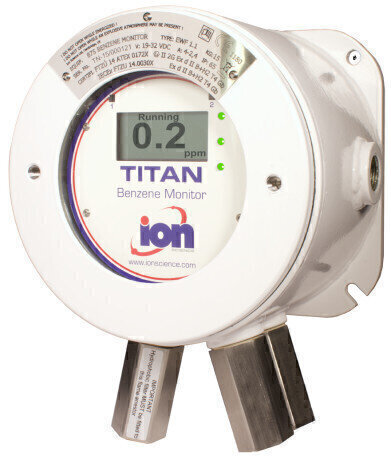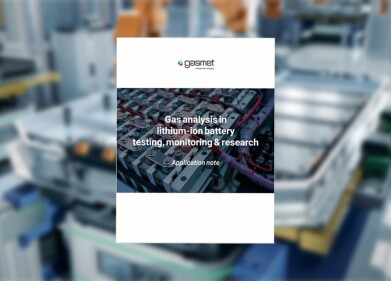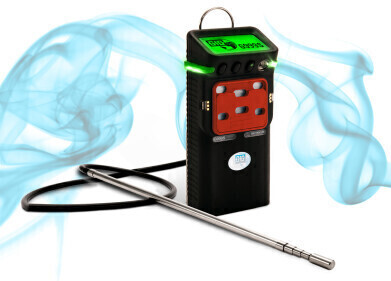Health & Safety
Benzene Specific Monitor Set to Help US Refineries Meet New EPA Regulations Covering Mandatory Fence Line Monitoring
Sep 06 2016
As the world’s first continuous benzene specific monitor, the ‘Titan’ from Ion Science (UK) is set to help US-based petroleum refineries meet new Environmental Protection Agency (EPA) standards. These regulations, which come into force in 2018, are designed to reduce toxic chemical emissions, improve air quality and significantly decrease risk to public health in communities surrounding these facilities.
Following high profile litigation cases, such as that involving four-year old Jarrett McElheney who contracted leukaemia while living on a mobile home park opposite a tank farm for storage of petroleum products, benzene exposure limits have been changed. The Occupational Health & Safety Administration, (OHSA), has already tightened limits; for example in June 2014, California lowered its long-term exposure level for the carcinogen from 20ppm to 1ppb.
On September 29th 2015, the EPA issued a final rule that will further control benzene emissions from petroleum refineries and ensure key information about exposure to the chemical is provided to the public and neighbouring communities.
In 2018, it will be a national regulation requiring refineries to monitor benzene at key emission sources within their plants and around fence lines. The EPA stipulates that monitors should be able to detect benzene at very low levels and must encircle the facility to better identify sources of pollution under any wind direction.
With the EPA’s increased monitoring requirements, petrochemical companies and other industrial facilities will need to utilise the latest state-of-the-art measurement technology.
The revolutionary ‘Titan’ has been specially designed for accurate and reliable detection of ambient benzene in petrochemical applications where traditional methods suffer cross interference.
Benzene is a constituent of crude oil and becomes gaseous during petrochemical processing but it is also used as a solvent in the production of drugs, plastics, synthetic rubbers and dyes. It is a carcinogen with very low work exposure limits making sub parts per million (ppm) measurement an essential requirement.
Traditional photoionisation detection (PID) monitors easily detect benzene but they also identify other less harmful volatile organic compound (VOC) gases that are normally present at the same time.
As the world’s first truly selective wall-mounted benzene monitor, the Ion Science ‘Titan’ is set to be a real game changer for the petrochemical industry and refinery applications in particular. Incorporating the well-proven Ion Science MiniPID technology, ‘Titan’ is highly sensitive and capable of detecting benzene levels down to 0.1ppm and up to 20ppm.
Offering rapid and accurate detection, ‘Titan’ continuously samples and analyses the environment to provide real-time feedback of ambient benzene levels. When a sample is taken, the benzene component is chemically filtered using a robust separation technology so ensuring no false-positives are measured with potential cross-contaminating compounds in the atmosphere.
Ion Science’s ‘Titan’ features a clear display and provides users with an immediate warning alarm system when hazardous levels of benzene are detected ensuring the on-going safety and protection of workers.
The instrument also provides two relays with configurable levels to integrate into site alarm systems.
Connection to the ‘Titan’ is made via RS485 or USB. The internal memory capacity can store over two years of data which facilitates the analysis of trends and allows activity levels to be accurately identified.
Designed to operate in conditions ranging from -20 ºC up to +55 ºC, ‘Titan’ is unaffected by changes in ambient temperature. It incorporates two temperature regulation systems to ensure critical components perform optimally.
Modular in design, ‘Titan’ is easy to service and designed to operate for 6 months without intervention. Working parts can be easily removed and serviced, or replaced with another ‘plug and play’ service module. It also provides removal of particulate contamination in the air stream to provide long-term service free sampling.
Like all Ion Science PID instruments, ‘Titan’ utilises the company’s unique patented Fence Electrode technology for unrivalled resistance to humidity and contamination. This key feature makes ‘Titan’ ideal for extended operation in harsh environments. The ‘Titan’ is designed to IP65 and meets ATEX, IECEx, North American and Canadian safety standards.
Duncan Johns, Managing Director at Ion Science says: “Like most Ion Science products, the ‘Titan’ has been developed as a result of listening to our customers and understanding the changing needs of our target markets. We’re so excited to be able to offer the US a benzene specific technology in a practical solution that is specially designed to help protect employees and the public from exposure and limit potential liability as a result.”
Digital Edition
IET 34.2 March 2024
April 2024
Gas Detection - Biogas batch fermentation system for laboratory use with automatic gas analysis in real time Water/Wastewater - Upcycling sensors for sustainable nature management - Prist...
View all digital editions
Events
Apr 30 2024 Melbourne, Australia
Apr 30 2024 Birmingham, UK
May 03 2024 Seoul, South Korea
May 05 2024 Seville, Spain
May 06 2024 Minneapolis, MN, USA


















